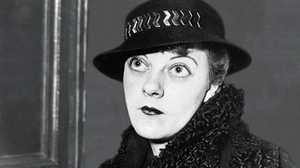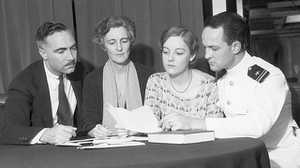Grace Hubbard Fortescue (1883-1979)

Grace Hubbard Fortescue brashly told a journalist that January 8, 1932, was "the day of the murder" before she went on trial for the killing of Joseph Kahahawai. A member from birth of the U.S. social elite, Fortescue was accustomed to doing anything she wished. She had no fear of calling Kahahawai's death just what it was, a murder, because she had no reason to believe that she would ever be punished for her role in it. In her mind, killing a man to save her daughter's reputation was completely and undeniably justified.
Bell's Niece
Born in 1883, Grace Fortescue was the granddaughter of Gardiner Hubbard, a wealthy financier who became the first president of Bell Telephone. Hubbard had backed Alexander Graham Bell, his son-in-law and Grace's uncle, for the commercial debut of Bell's invention, the telephone. Grace grew up playing in the sprawling grounds of Twin Oaks, the mansion her grandfather built in the upscale Rock Creek area of Washington, D.C.
Society Girl
As a young debutante, Grace found her cultured background served her well. In 1910, she married Major Granville "Rolly" Fortescue, who was in the Rough Riders. He had served with Theodore Roosevelt in the Spanish-American War and had been wounded at San Juan Hill. The young couple embarked on a life of travel and privilege.
Keeping Up Appearances
When her husband failed to be as financially successful as she had expected, Grace Fortescue did all in her power to maintain a façade of success. She knew the value of appearances. As soon as she received a cable from her son-in-law, Lieutenant Thomas MAssie, saying that her daughter Thalia had been assaulted, Fortescue packed her trunk for the long trip to Hawai'i.
Murder Without Remorse
Though Thalia was a controversial and somewhat disliked figure in her Hawaiian Naval circles, Fortescue was dismayed to hear her daughter's "good name" drawn through the mud. After the case against Thalia's alleged assailants ended in a mistrial, Grace set her mind to squashing the gossip purporting that Thalia had made up the rape. Mrs. Fortescue and Lieutenant Massie came to the conclusion that the only way to correct the terrible injustice against Thalia's reputation was to secure a confession from one of the accused men. Whether or not there was a plan to kill Kahahawai before kidnapping him, Grace Fortescue certainly did not exhibit any remorse about his death. As New York Times journalist Russell Owen reported in an exclusive interview on February 7th, two months before Fortescue's trial, "Mrs. Fortescue's chief concern seems to be that the affair was bungled."
Beyond Justice
Nor did Fortescue's friends in high places seem troubled by her criminal role. The deck of the Alton, where the four defendants were held in protective custody by the Navy before and during the trial, was covered stern to bow with floral arrangements and notes of encouragement from friends in politics and society. Friends of the family, possibly including Navy personnel, raised the money to pay the nation's top defense attorney, Clarence Darrow, to lead the defense in The Territory of Hawai'i vs. Grace Fortescue, et al. U.S. newspapers ran banner headlines characterizing Kahahawai's death as an "honor killing" and reporting sympathetically about Fortescue and Massie's revenge — justifiable, in many Americans' minds — against Thalia's alleged assailant.
A Charming Prisoner
Grace's composure upon being arrested mesmerized the reporters and police officers on the scene. After the indictment, she spent one night in jail, where her poise endeared her to journalists and jail personnel. Absurdly enough, Grace Fortescue invited the jail matron and the cook to join her for a cup of coffee in her cell. The importance of appearing refined and calm at all times — and denying that her actions were criminal -- perhaps paralleled Darrow's belief that "you never see a good looking woman convicted of murder or manslaughter -- or refused alimony."
Unscathed
Fortescue's ability to weather the Hawaiian storm she helped create enabled her literally to get away with murder. Though she was convicted of manslaughter in the death of Kahahawai, Fortescue had her sentence commuted from ten years in prison to an hour spent with the territorial governor, after white outcry against the guilty verdicts. Grace Fortescue headed back to the States and made money off of her story, then settled down to live out her days in leisure and comfort after inheriting a fortune from her father. She died in 1979, at the age of 95, outliving both her daughter Thalia and her son-in-law.







